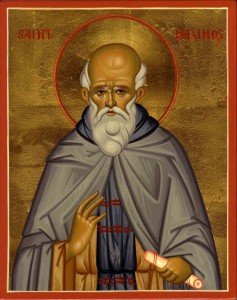We Eastern Christians follow St. Maximos the Confessor, one of the greatest of systematic theologians. He died in 662 CE from mutilation that was inflicted by the government after his arrest along with Pope St. Martin I. He named eight deadly sins rather than the seven of the Latin tradition (it wasn’t hard to get charged with wrong-doing in those early years). Eastern Christians include in their list of the deadly sins sadness or despondency. Rather than viewing the seven capital sins as equal spigots of evil as the Latin tradition does, Byzantines envision the deadly sins in a hierarchy, or perhaps more accurately, as a sick rainbow. This rainbow of sin begins in the carnal passions, gluttony and fornication, proceeds through the psychological passions, greed anger, sloth and sadness in that order (sometimes you find these last two reversed); and finally reaches its zenith in the spiritual passions, vanity and pride. This sense of sins as “nesting one inside the other” leads in Byzantine spirituality to an emphasis on the need for fasting and to a cleansing of the soul to allow it to move toward God by cutting the roots of sin.
As you can probably imagine, the Eastern approach is much, much different from that of the Western Church. Thus, because there was always some sort of competition between the East and the West for a truly correct expression of the faith, there was conflict.
Gregory of Nyssa taught that unless it is impeded by passions and other obsessions, the soul has a natural innate tendency to gravitate toward God (he calls this in Greek epectasis). Like peeling off layers, the discipline of removing passions and distractions allows the soul to rise to God and to enjoy union with the Creator. Realizing that a complete purification might not be possible in this world, St. Gregory also taught that death is “the final medicine.”
To understand the concept of the role of the passions in Byzantine spirituality, we must point out that the concept rests on another, even more fundamental idea: the inheritance of death. In Byzantine thought, fear of death energizes the passions. The Greek text of Paul’s letter to the Romans can be read either as “because of sin all die” or as “all sin because of death.” The Greek text reads both ways simultaneously.
More to follow!

